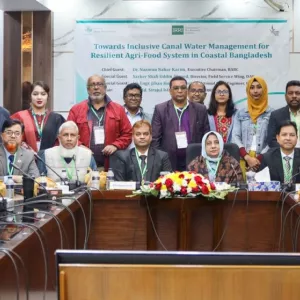Inclusive and equitable canal water management towards sustainable agriculture urged at Bangladesh policy dialogue
In the southern coastal deltaic regions of Bangladesh, freshwater canals are a lifeline to multiple food system-based livelihoods. However, these resources are mired in unequal conflicts and contestations, an outcome of resources appropriation and control by local elites and ambiguous interpretations of policies and strategies. Marginalized farmers and women who rely largely on agri-food systems-related livelihoods are most affected by

Inclusive and equitable canal water management towards sustainable agriculture urged at Bangladesh policy dialogue
In the southern coastal deltaic regions of Bangladesh, freshwater canals are a lifeline to multiple food system-based livelihoods. However, these resources are mired in unequal conflicts and contestations, an outcome of resources appropriation and control by local elites and ambiguous interpretations of policies and strategies.
Marginalized farmers and women who rely largely on agri-food systems-related livelihoods are most affected by these canal water appropriations. In response to this growing crisis, a national policy dialogue titled “Towards Inclusive Canal Water Management for Resilient Agri-Food System in Coastal Bangladesh” was held at the Bangladesh Agricultural Research Council (BARC) complex in Dhaka on 22nd December 2024, as part of the CGIAR Initiative on Asian Mega Deltas.
The event brought together community members, local representatives, development partners, NGO professionals, and government officials to address the pressing issue of canal lease abuse, as well as develop actionable pathways.
Freshwater canals store rainwater during the monsoon, supply water for agriculture and household use in the dry season, and serve as drainage channels during extreme rainfall events. Research by Dr. Mou Rani Sarker from the International Rice Research Institute (IRRI) found that many canals in the southwest coastal region are controlled by local elites or urban investors. “These powerful actors lease canals and alter them for profit through enclosing, diverting, or filling for shrimp and fish farming, as well as agricultural expansion,” Dr. Sarker revealed.
Dr. Fouzia Mannan, Professor at East West University, underscored the severe water insecurity faced by women in Satkhira, noting that two-thirds of women experience acute shortages. “Women bear the brunt of water scarcity, leading to increased domestic workload, economic losses, food poverty, physical strain, and heightened stress,” Dr. Mannan explained.
Dr. M. Mokhlesur Rahman, Executive Director of the Center for Natural Resource Studies (CNRS), highlighted policy gaps…

